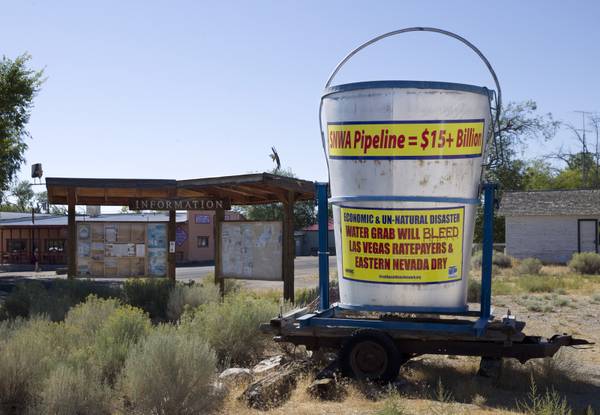Related news
A Nevada district court dealt a major blow to a 30-year-old, controversial proposal from the Southern Nevada Water Authority to pump groundwater from rural Eastern Nevada to Las Vegas.
The Seventh Judicial District Court in White Pine County ruled Monday against the water authority’s applications to pump groundwater in four valleys in White Pine, Lincoln and rural Clark counties. The court also rejected the water authority’s proposed mitigation plans to offset unintended consequences of the pipeline project, calling them arbitrary, unspecific and lacking in supporting evidence.
In addition, the court reversed a previous ruling that had granted the water authority rights to water in Spring Valley near Great Basin National Park. That award would lead to “water mining” and eventual depletion of the Spring Valley aquifer, Senior District Court Judge Robert Estes wrote in his decision.
The ruling is a victory for foes of the proposed multibillion-dollar water pipeline project, which calls for the construction of a series of buried pipelines north of the Las Vegas Valley extending 250 miles in order to supplement the valley’s limited water supply. First proposed in 1989, the plan has been stalled by legal challenges for years, with critics saying it would seriously impact water resources and biodiversity in Eastern Nevada.
Kyle Roerink, executive director of Great Basin Water Network, said the ruling appears to have finally killed the water authority’s proposal, which his organization has long challenged.
“With such a resounding and overwhelming victory for us, we really can’t see an appeal process that has any legs to stand on,” Roerink said. “On all the substantial elements, (the water authority) got nothing. They have no water rights.”
The water authority plans to evaluate its water resource plan in light of the ruling to ensure that it continues to meet water demands in the region, spokesperson Bronson Mack said in a statement.
“No decision has been made at this time regarding an appeal,” Mack said.
The agency has previously argued that the pipeline proposal would sustain Las Vegas as the region grows in population and as water levels decline at Lake Mead, the area’s primary source of water. However, the need for the project is not immediate, Mack said.
“Since these groundwater applications were filed more than 30 years ago, Southern Nevada has emerged as a world leader in urban water conservation. Through (the water authority’s) proactive water resource management and the community’s achievements in water efficiency, there is no scenario in our Water Resource Plan where this project would be needed within the next 30 years,” he said in a statement.
Pipeline opponents say the proposal would have devastating ecological impacts in Eastern Nevada, including in Great Basin National Park, and would harm ranching in rural areas. The Ely Shoshone and the Confederated Tribes of the Goshute Reservation have also objected to the project because of potential impacts on spiritual and cultural resources in the region.
Other groups that have challenged the pipeline in court include White Pine County, Utah’s Juab and Millard Counties near the Nevada border, and the Church of Jesus Christ of Latter-Day Saints.
Monday’s ruling came in response to appeals filed over the last few years that disputed aspects of a 2018 decision from former Nevada State Engineer Jason King. In that decision, King denied four of the water authority’s pipeline applications, but said he was only doing so to comply with a 2013 ruling from the Seventh Judicial District Court that he deemed flawed.
As a result, King’s successor, Tim Wilson, asked the court to revisit its own 2013 ruling that purportedly forced the state engineer to reject the water authority’s applications. In turn, the water authority asked the court to grant the groundwater pumping applications, while opponents of the project — Great Basin Water Network, Native American tribes, counties in Eastern Nevada and Western Utah and the LDS Church — wanted the court to overrule the water authority’s mitigation plans.
Only the pipeline opponents got what they wanted Monday. In rejecting the water authority’s plans to mitigate potential negative impacts of the pipeline project, Estes called the plans “nonexistent.” The water authority has said it would be premature to outline the full plans until pumping were to begin, but considering the size and significance of this proposal, Estes found that argument unconvincing.
“This court finds that approving parts of a 3M plan in which there is no evidence, let alone substantial evidence, is simply arbitrary and capricious,” he wrote.
It is unclear whether King, through the Nevada Department of Conservation and Natural Resources, plans to appeal the ruling to the Nevada Supreme Court. A spokesperson for the department said they were unable to comment at this time.

